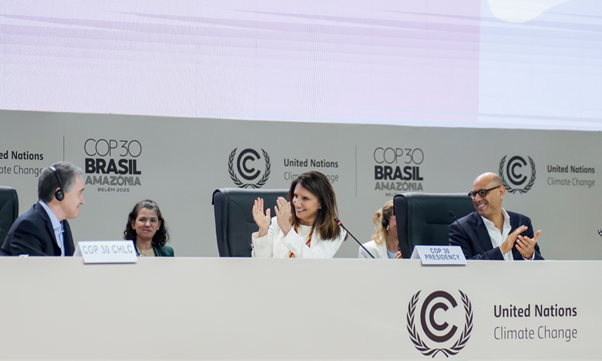COP30 : climate emergency takes centre stage as solutions fall behind
COP30, held from 6 to 21 November 2025 in Belém, Brazil, delivers a mixed outcome. While a historic agreement was reached to triple adaptation finance, commitments to phase out fossil fuels remain vague. Many observers describe it as a summit of action… but also of inertia. Analysis.

The COP30 closed with notable advances — but also significant disappointments. According to the World Meteorological Organization (WMO) report released for the occasion, greenhouse gas concentrations continue to reach record levels, and 2025 stands as one of the hottest years ever recorded, with an average temperature from January to August at +1.42 °C above pre-industrial levels. These scientific findings were central to the negotiations: the summit was meant to translate urgency into action.
A tripled adaptation finance… but without a clear plan
The key success of COP30 lies in the commitment to triple adaptation finance by 2035 — a measure hailed as crucial for the most vulnerable countries. However, details remain unclear: the contributors, exact amounts, and allocation modalities are not fully defined, raising doubts about real implementation.
At the same time, a “Just Transition Mechanism” was launched to support workers in fossil fuel sectors as they shift toward a greener economy — an important development, though lacking firmly defined financial guarantees.
A stalled roadmap on fossil fuels
This is perhaps the most significant failure: despite pressure from a coalition of more than 80 countries pushing for a roadmap to phase out coal, oil, and gas, no explicit commitment made it into the final text. Wealthy fossil-fuel-dependent states such as Russia, along with major oil producers, held back, leaving the debate open for future COPs.
For many observers, this omission weakens the overall impact of the summit. UN Secretary-General António Guterres had nonetheless warned at the opening that failing to limit warming to 1.5 °C is “a moral failure and a deadly negligence.”
Methane commitments… barely binding
On methane — a highly potent greenhouse gas — COP30 saw commitments, including a coalition of 11 countries (France, the United Kingdom, Japan, etc.) agreeing to reduce emissions in the oil and gas sector by 2030, specifically by addressing flaring and leaks. However, these commitments remain largely voluntary and non-binding — a point of frustration for environmental activists who argue the announcements fall far short of the global climate emergency.
Focus on human adaptation and ecosystems
Health emerged as a major priority. The Belém Health Action Plan (BHAP) was adopted to strengthen health systems in the face of climate impacts, with a commitment of USD 300 million from philanthropies, according to official sources.
Another major pillar of COP30 was ocean protection. On 18 November, 17 countries joined the Blue NDC Challenge to integrate marine-based solutions into their climate plans. A “One Ocean” Partnership was launched with the goal of mobilizing USD 20 billion for a regenerative blue economy.
A new 2025–2030 Action Agenda

Organizers unveiled a new five-year Action Agenda (2025–2030), the result of consultations across 122 countries, intended to guide global efforts under the Paris Agreement. The program is built around six thematic pillars, ranging from energy transition to urban resilience, including finance and technology.
However, the massive presence of fossil-fuel lobbyists was widely criticized: more than 1,600 industry representatives attended the summit in Belém, raising concerns about their influence on negotiations.
For Africa and the most vulnerable countries, tripling adaptation aid is a clear victory — but the credibility of the entire compromise will depend on its effective implementation
At the end of COP30, the outcome appears modest but meaningful: concrete progress on adaptation, health, and oceans, but a marked shortfall on fossil fuel phase-out.
For Africa and the most vulnerable countries, tripling adaptation aid is a clear victory — but the credibility of the entire compromise will depend on its effective implementation.
The ambitions expressed — energy transition, climate justice, finance — remain a gamble. If these commitments are not rapidly converted into tangible action, the rhetoric risks turning into empty promises. COP31 will need to clarify the energy roadmap and strengthen guarantees to ensure that this “COP of action” does not remain a missed opportunity.






